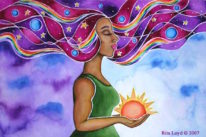
“Love rests on two pillars: surrender and autonomy. Our need for togetherness exists alongside our need for separateness.” ~ Esther Perel
Healthy relationships require a delicate balance of intimacy and autonomy, giving and receiving, self and other.
As we struggle to walk this delicate tightrope, we might feel less like graceful acrobats and more like pendulums swaying recklessly from side to side. As I reflect on my own romantic journey, I notice a trend: I got very close to past partners, losing myself in them entirely, and then emerged from the codependent haze terrified and self-abandoned.
“Never again!” I would vow. “I’d rather be alone than lose myself in a relationship!” So I’d spend a few months embracing utter independence —dating sporadically, not getting attached, heart under lock and key—until my loneliness sent me into the arms of another partner.
So wherein lies the balance? The answer can be found in the idea of interdependence: relationships that rely on mutual intimacy and mutual separateness.
Licensed professional counselor Jodi Clark explains that “an interdependent person recognizes the value of vulnerability, being able to turn to their partner in meaningful ways to create emotional intimacy. They also value a sense of self that allows them and their partner to be themselves without any need to compromise who they are or their values system” (emphasis added).
In contrast, codependent relationships exist between partners who rely predominantly on each other for their sense of value or purpose. People in codependent relationships tend to neglect themselves while over-prioritizing their partners’ values, needs, and dreams. The result? A painful and tangible loss of self.
So how can we walk the tightrope of togetherness and separateness gracefully? After all, attachment to others isn’t wrong—it’s natural and necessary. But how much is too much? How can you tell if your relationship is codependent or interdependent?
Here are 7 key points that differentiate codependent from interdependent relationships:
1. Codependent relationships: I use my partner’s love to fill a void of self-love.
Interdependent relationships: I love myself and my partner at the same time.
In codependent relationships, it may feel like there’s not enough love to go around —because there’s not. A codependent partner may make up for her own lack of self-love by attempting to fill her empty well strictly with her partner’s love. She may be hyper-vigilant, scouring for scraps of love the way a vulture might.
That’s how I felt before I entered codependency recovery. My love for myself was so scarce that I felt like a starving castaway, desperate for anything that resembled sustenance. My desperation made me more likely to accept meager substitutes for love. I craved attention—even if it was of the negative variety.
In interdependent relationships, we replace that scarcity mentality with an abundance mentality. There is plenty of love to go around. We have a wellspring of self-love and—icing on the cake!—love from a partner who cares for us deeply.
2. Codependent relationships: I under-communicate my own needs in order to prioritize my partner’s needs.
Interdependent relationships: I’m free to express my needs and I am receptive to my partner’s needs.
Healthy interdependent relationships do not require partners to shrink, minimize, or subjugate themselves. They allow for free expression by both parties.
This isn’t to say that everyone’s needs are met 100% of the time. However, both partners understand that they are complex, unique beings with a diverse array of needs and preferences. A difference in opinion doesn’t have to threaten the safety of the relationship.
As the saying goes: “Any relationship you have that could be ruined by having a conversation about your feelings, standards, or expectations wasn’t really stable enough to begin with.”
3. Codependent relationships: I use time with my partner to avoid being alone.
Interdependent relationships: I enjoy alone time and time spent with my partner.
If we can’t find peace or pleasure in our own company, we’ll place unrealistic burdens on our relationships to be our sole providers of happiness.
Years ago, the stretch of hours that separated the end of the workday from seeing my partner stretched on like an infinite desert. I felt terribly anxious in my own company and used any numbing agent I could to pass the time: shots of vodka at 4pm, binge-watching Girls, whatever. When I could see my partner, my night finally began in earnest. My then-partner could sense this, of course, and felt justifiably burdened by my absence of a private life.
Enjoying our own company allows us to enjoy time with our partners without using that time to escape from our own anxiety. It also allows our partners to feel valued for who they are—not for the negative emotions they prevent us from feeling.
4. Codependent relationships: My relationship is responsible for making me happy.
Interdependent relationships: I am responsible for my own happiness and love co-creating joy with my partner.
Can romantic partnerships make us happy? Absolutely.
Will we be happy if our romantic relationships are our sole source of happiness? Absolutely not.
Where our happiness or mental health is concerned, we can’t put all of our eggs in one basket. The risks are too great.
I still remember the days when having a disagreement with my then-partner felt like the end of the world. When we were arguing, everything was wrong. The single spout that distributed my happiness was broken! This was not the recipe for a grounded or balanced life.
My tunnel-vision meant that I was more likely to be reactive in arguments, less likely to give my partner space when he needed it, and more likely to respond to small differences of opinion as if they were catastrophes —which leads me to Point 5…
5. Codependent relationships: I cannot tolerate intense emotions. In order to calm down, I need my partner to soothe me.
Interdependent relationships: I can soothe myself when I’m distressed, and I ask for help when I’d like support.
Learning how to self-soothe when distressed provides us a powerful foundation of resilience, inner strength, and self-trust.
When I’m distressed, I follow a personal blueprint. Depending on my mood, I might rest in bed and wait for my nervous system to calm, go for a run to release my energy, or journal. I also have a shortlist of folks I feel comfortable calling that includes a few dear friends, my sponsor, my family, and my partner. My partner is one ofmy sources of self-soothing; he is not the only source.
If my partner doesn’t have the capacity to soothe me in a given moment, he knows that I can meet that need in other ways. He doesn’t feel like he must neglect his own needs in order to protect my mental or emotional health. When one partner must neglect their own well-being to soothe another, resentment inevitably follows.
6. Codependent relationships: I prioritize my partner or my partnership at the expense of my own goals and dreams.
Interdependent relationships: I feel free to pursue my own goals and dreams and can build a life with my partner.
All relationships require some degree of compromise. However, we can only compromise so much before our sense of self begins to erode. If you find yourself sacrificing the bulk of your dreams and desires to benefit your partnership, you’re probably not truly meeting in the middle.
Sacrificing our goals can have unintended and disastrous consequences on the very relationships we sacrificed them for. Separated from our dreams, we are divorced from a core component of who we are. We lose the lifeblood, the motivation, and the energy that propel us forward in the world. The unique skills and gifts we possess rust and decay from underuse. Like clockwork, our sense of purpose, value, and self-worth decline.
If your partnership is totally at odds with your own vision for the future, think carefully. Your partner can simultaneously be a fantastic person and completely misaligned with your goals.
7. Codependent relationships: I can’t imagine leaving my partner under any circumstances.
Interdependent relationships: I am deeply invested in my partnership and I know that I can walk away if it becomes toxic or unhealthy.
Both partners must be willing to leave a relationship should it ever become toxic or unhealthy.
“But wait,” you might be thinking, “doesn’t that mean that they’re just not really committed to each other?”
Not at all. Being able to persevere through a period of disagreement, tension, or stagnancy is essentially a prerequisite for a long-term relationship. Subjecting yourself to an unhealthy or toxic dynamic, though, is another thing entirely. Unwillingness to leave a toxic partnership (when otherwise able to do so financially and logistically) demonstrates a profound lack of self-love and self-advocacy.
Even when deeply unhappy in their partnerships, many codependent folks feel incapable of leaving —or of setting effective boundaries with their partners. This paralysis is often driven by beliefs such as “Life would be meaningless without them,” “I could never find anyone else,” “I’ll be alone forever,” or “It’s better to be unhappily married than single and alone.”
It’s easy to see how a lack of self-love contributes to this scarcity mentality.
If you recognize yourself in the above depictions of codependent relationships, don’t be discouraged. I have been in deeply codependent partnerships before and now find myself agreeing with every interdependent statement on this list. With effort and practice, it is possible to outgrow our codependent conditioning and find healthy, interdependent relationships.
At its core, codependency is a dysfunctional relationship with the self that stems from a lack of self-worth—and is generally the result of being raised in a neglectful or dysfunctional family. When we rediscover our own sense of purpose, value, and self-compassion, we no longer need to rely on our partners for our sole sense of self-worth. We can engage in our relationships in balanced, grounded, other-loving, and self-loving ways.
About Hailey Magee
Hailey Magee is a Codependency Recovery Coach who helps individuals conquer people-pleasing, set empowered boundaries, and master the art of speaking their truth. She has worked with over 100 clients from the US, Canada, Ireland, France, South Africa, and more. Sign up for a complimentary consultation to learn how coaching can help you live from a place of authenticity and inner freedom. You can follow Hailey on Facebook and Instagram, or visit www.haileymagee.com.
- Web |
- More Posts












 Though I run this site, it is not mine. It's ours. It's not about me. It's about us. Your stories and your wisdom are just as meaningful as mine.
Though I run this site, it is not mine. It's ours. It's not about me. It's about us. Your stories and your wisdom are just as meaningful as mine.
This is a really fantastic article. I’ve suffered with codependency all my adult life and now at 38, I’m starting the road recovery. I’ve just met someone new and don’t want the same mistakes to happen so this article is spot on and I shall use it as a guide! Thanks again x